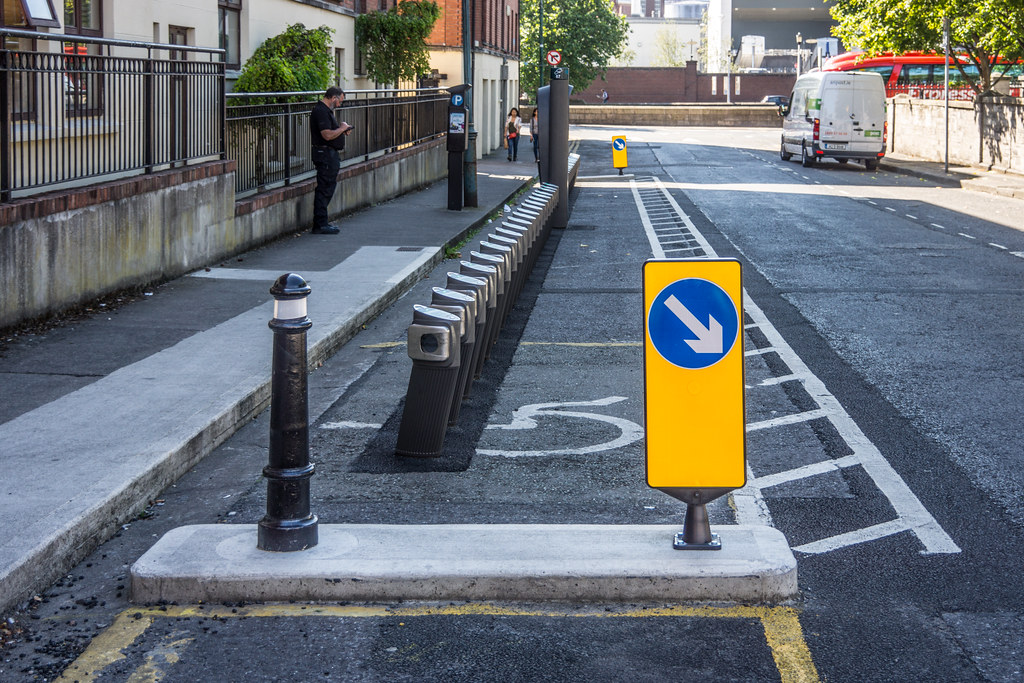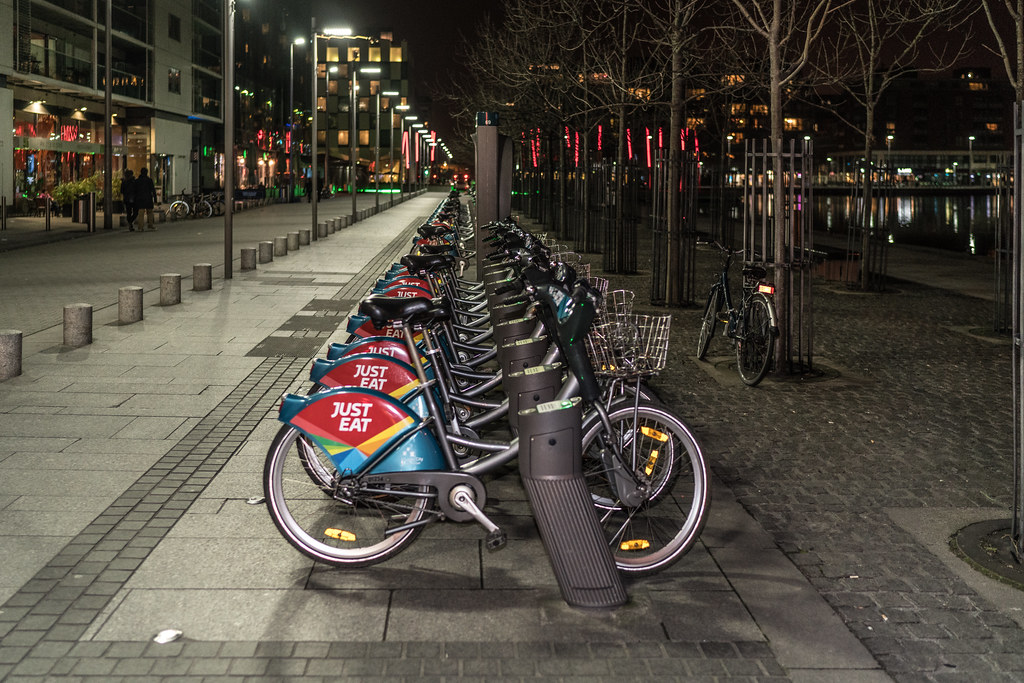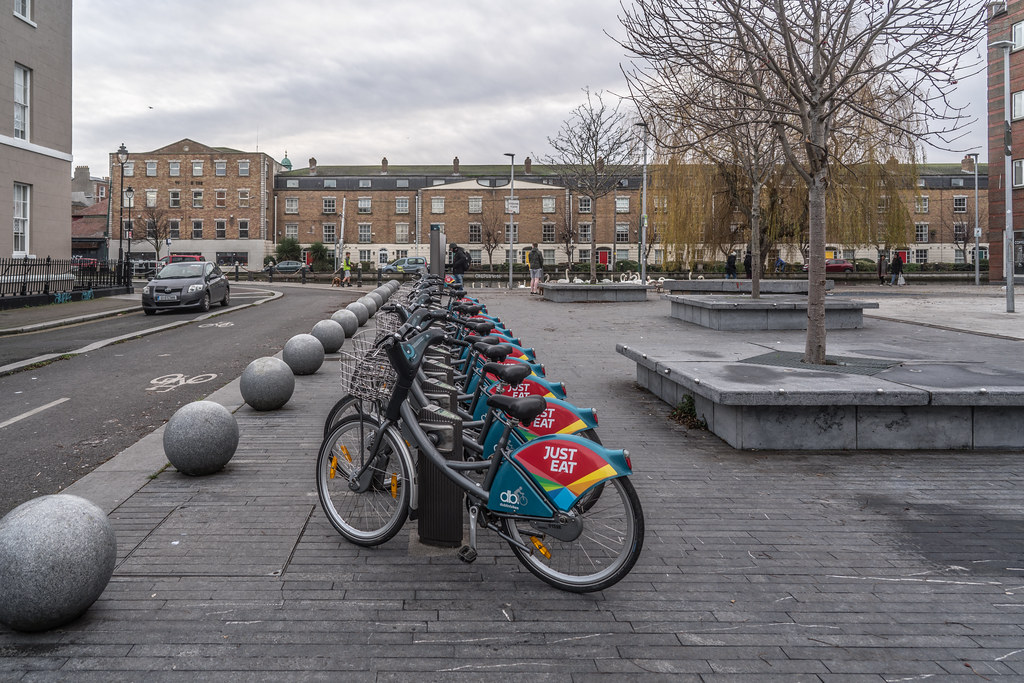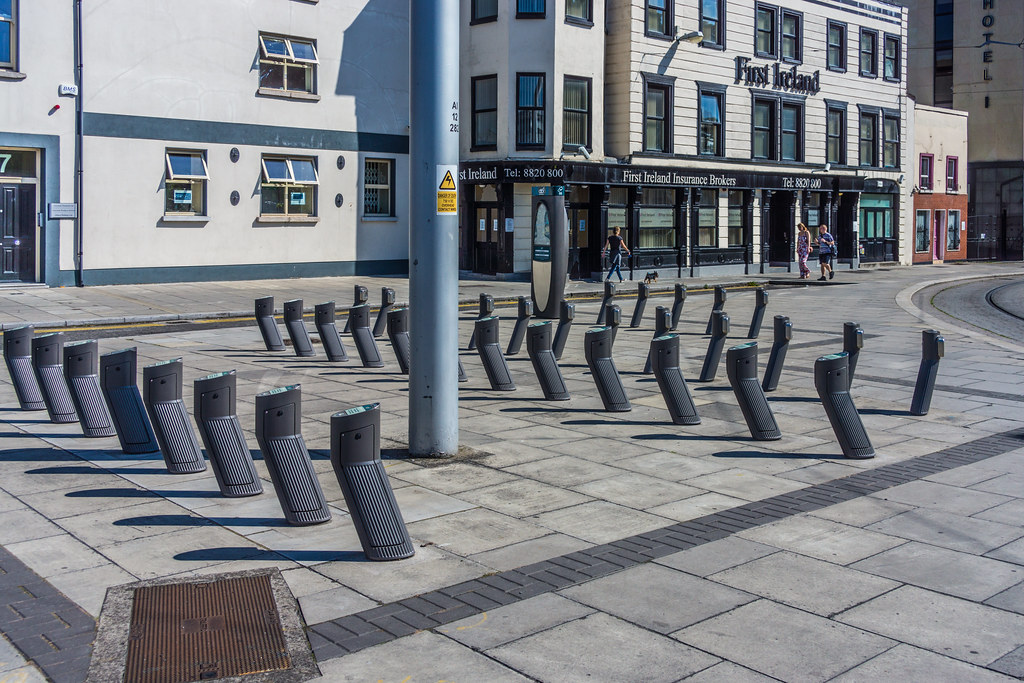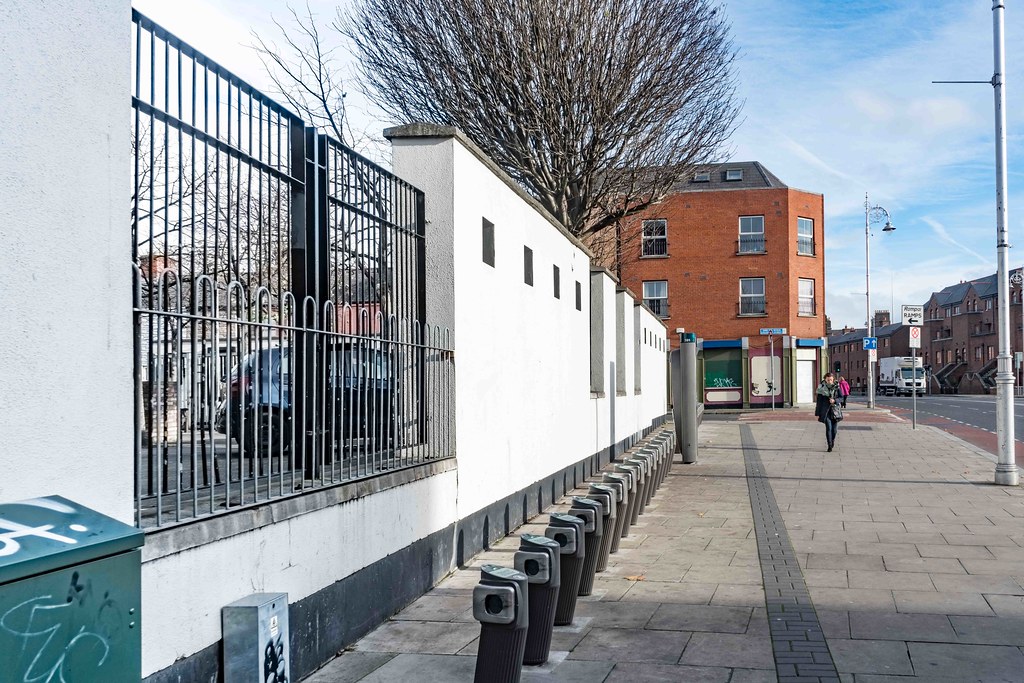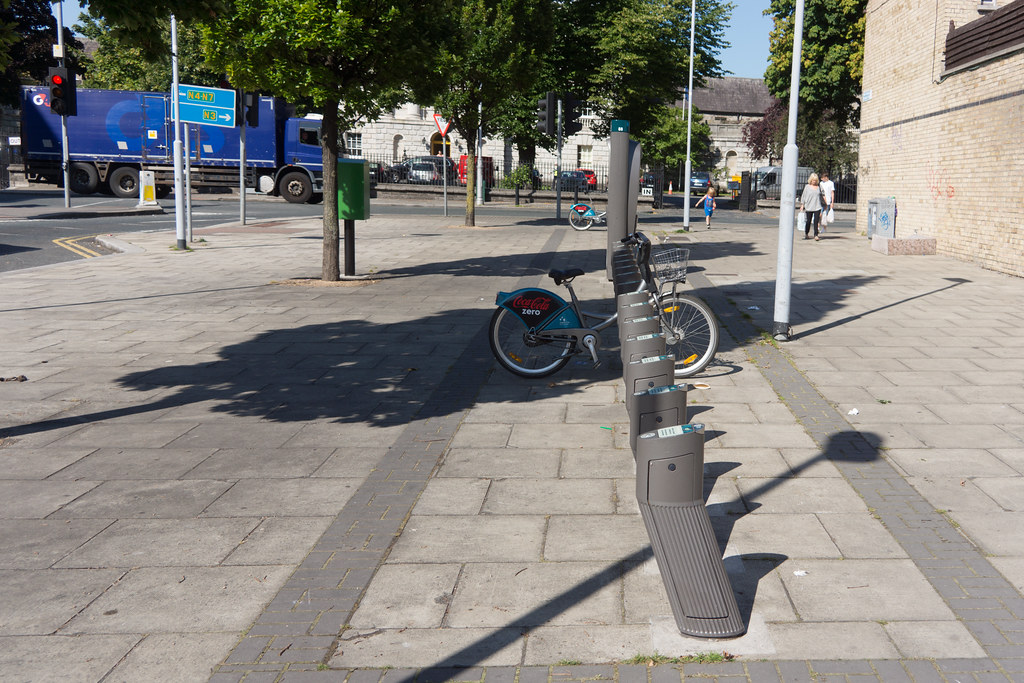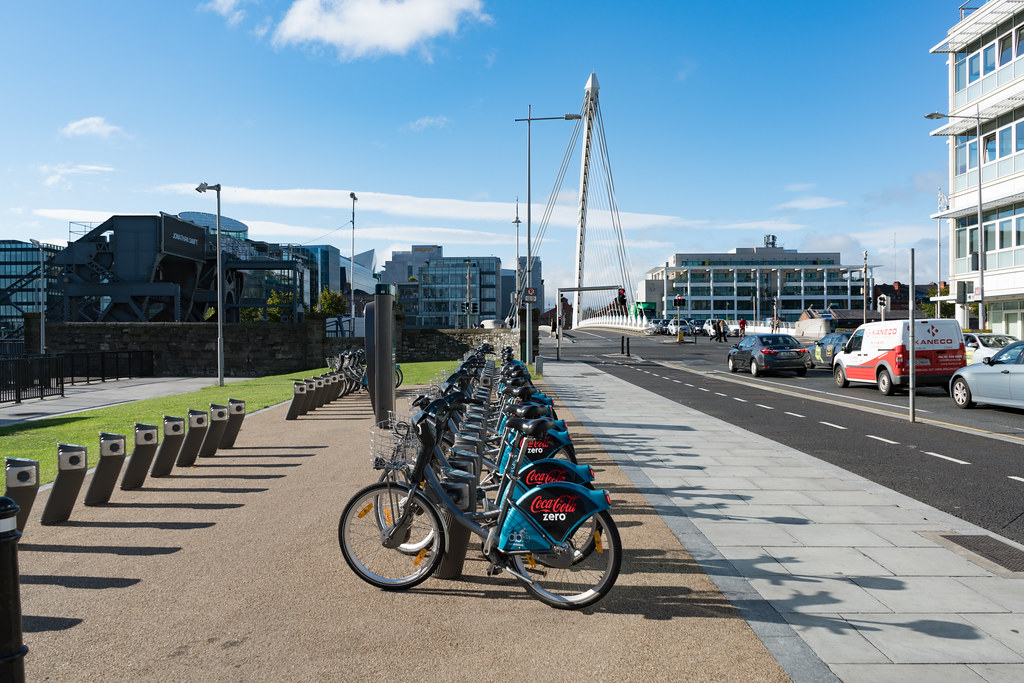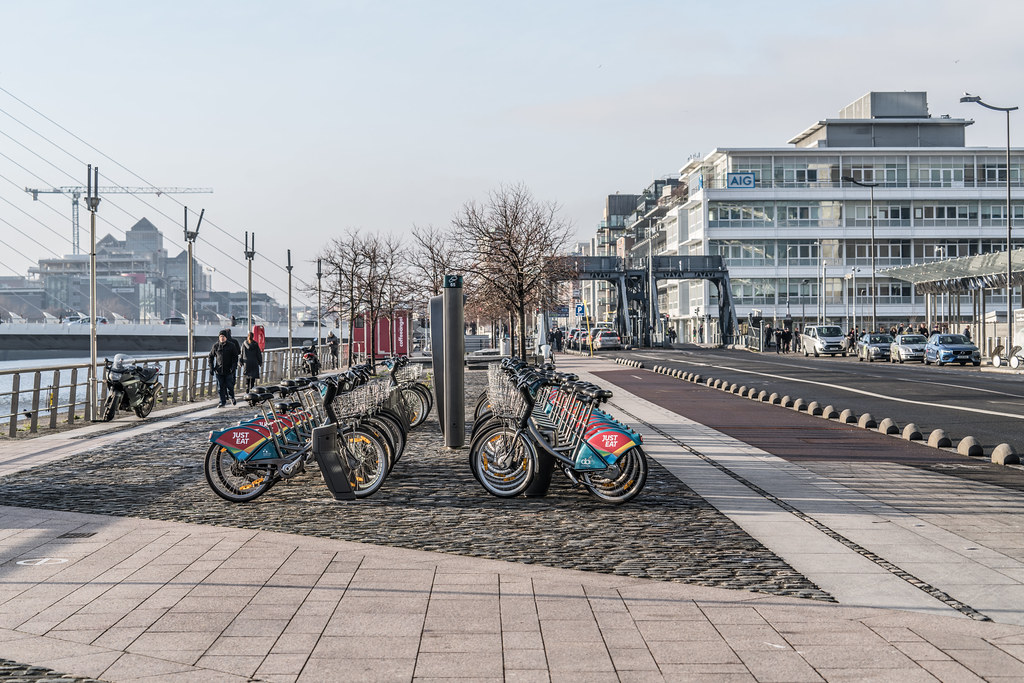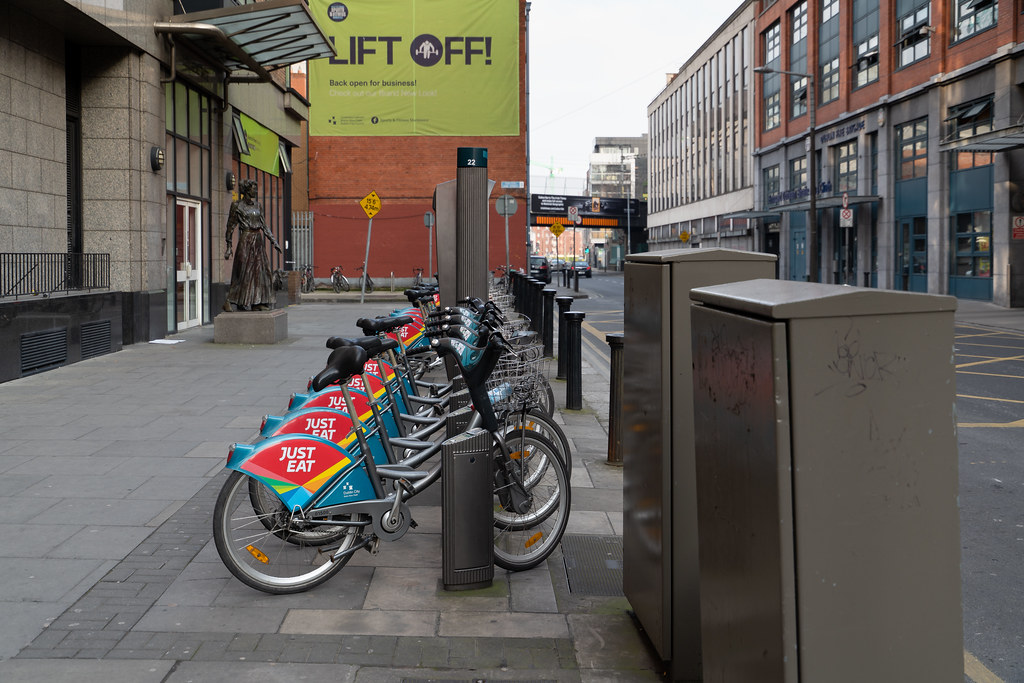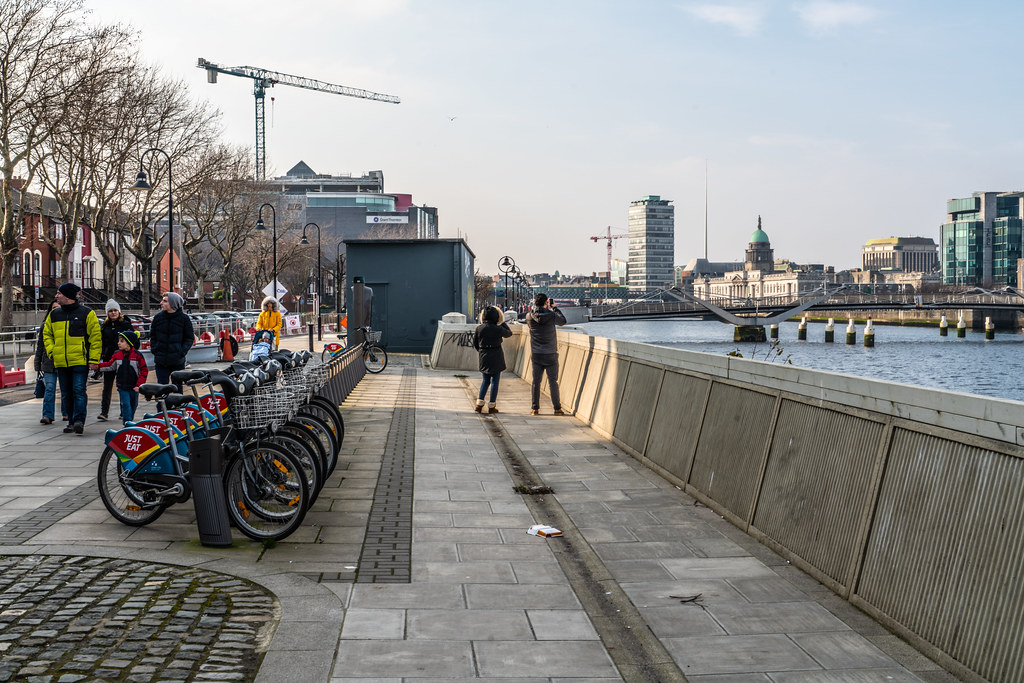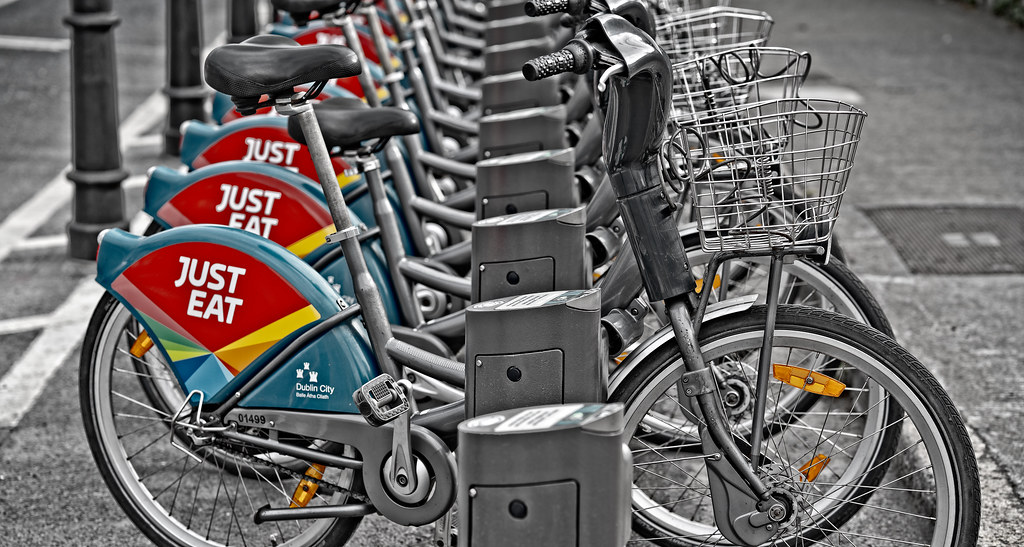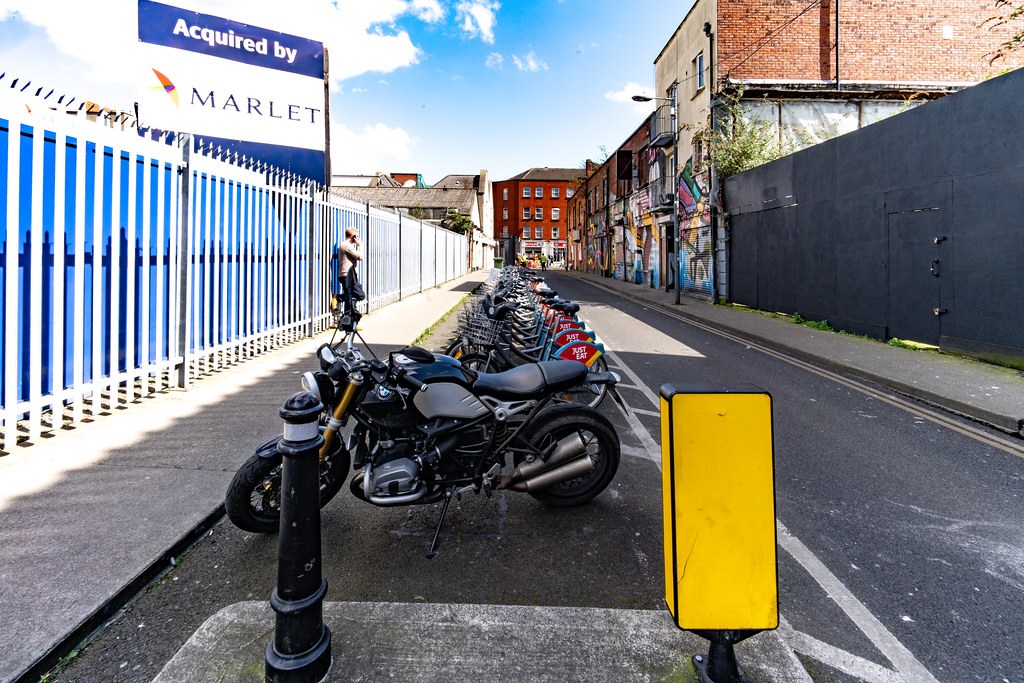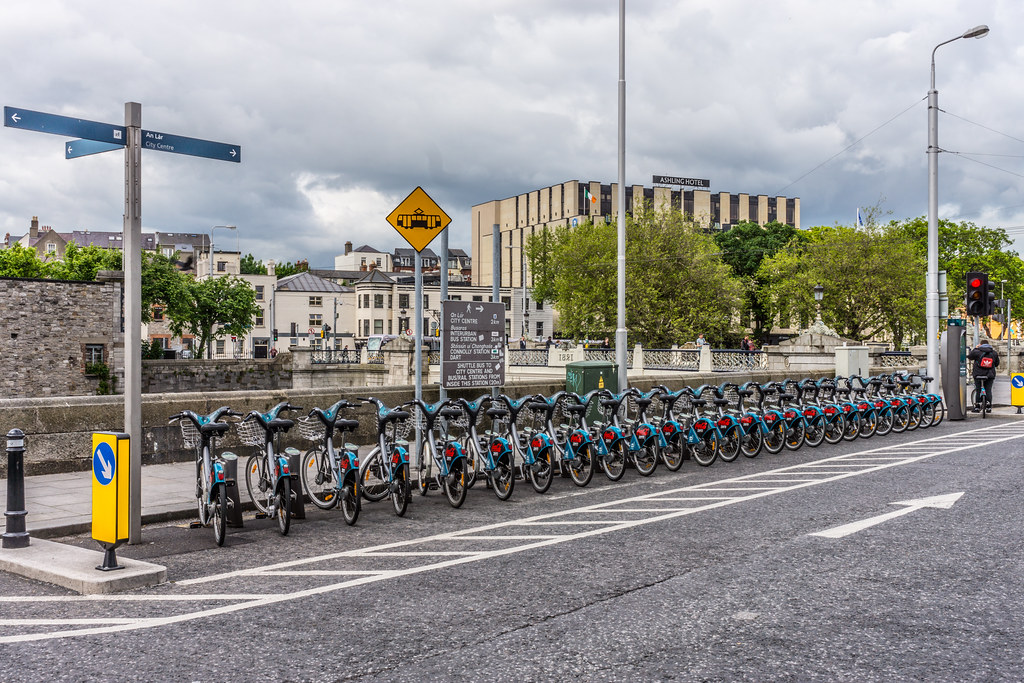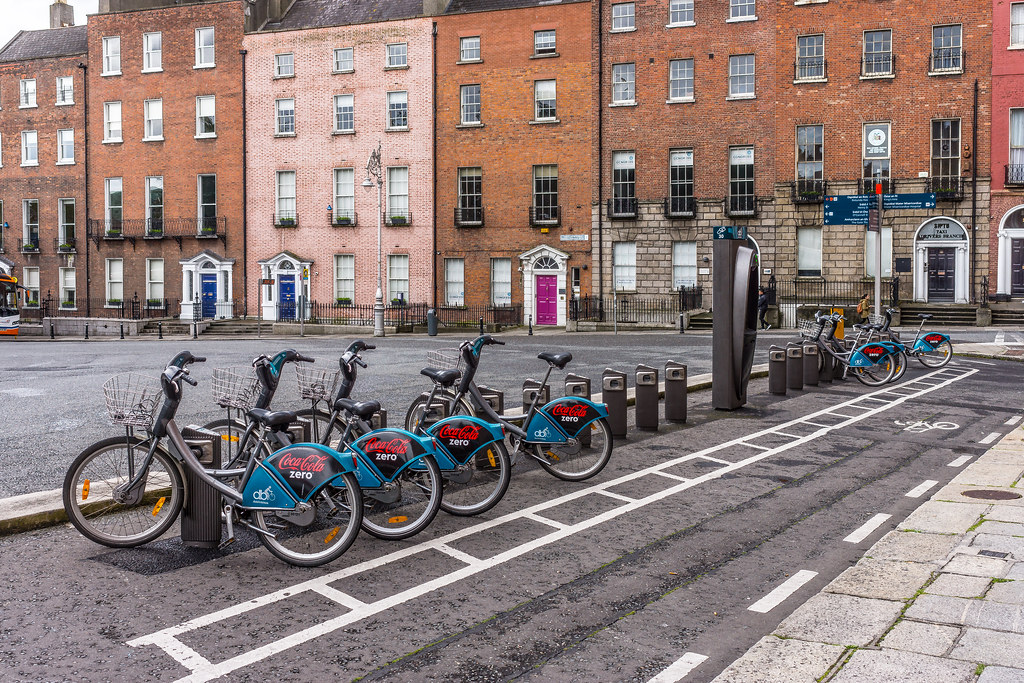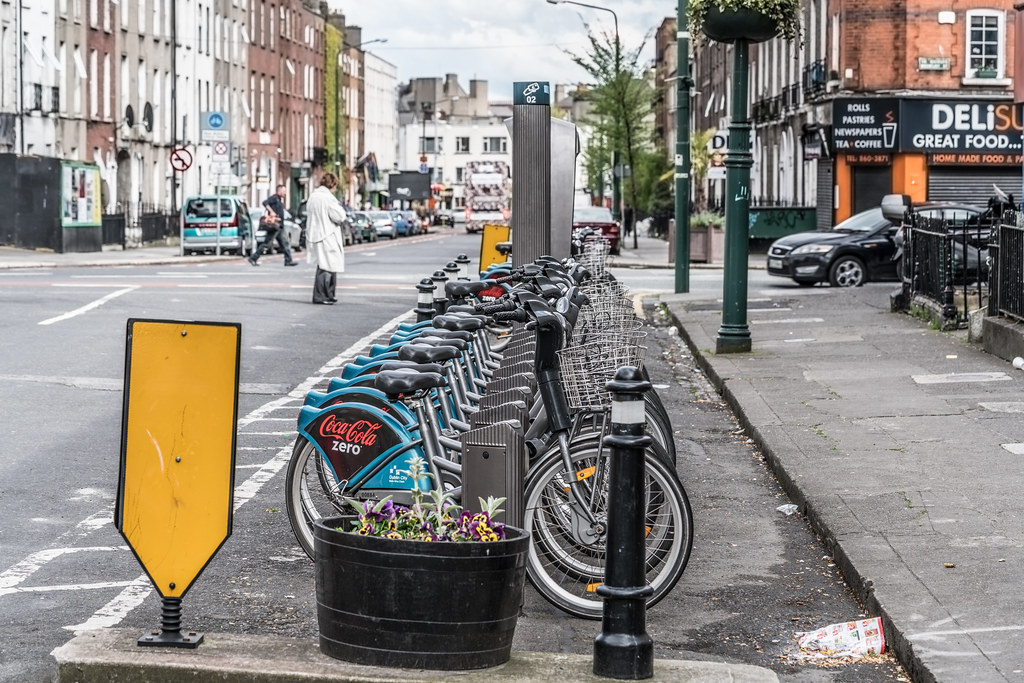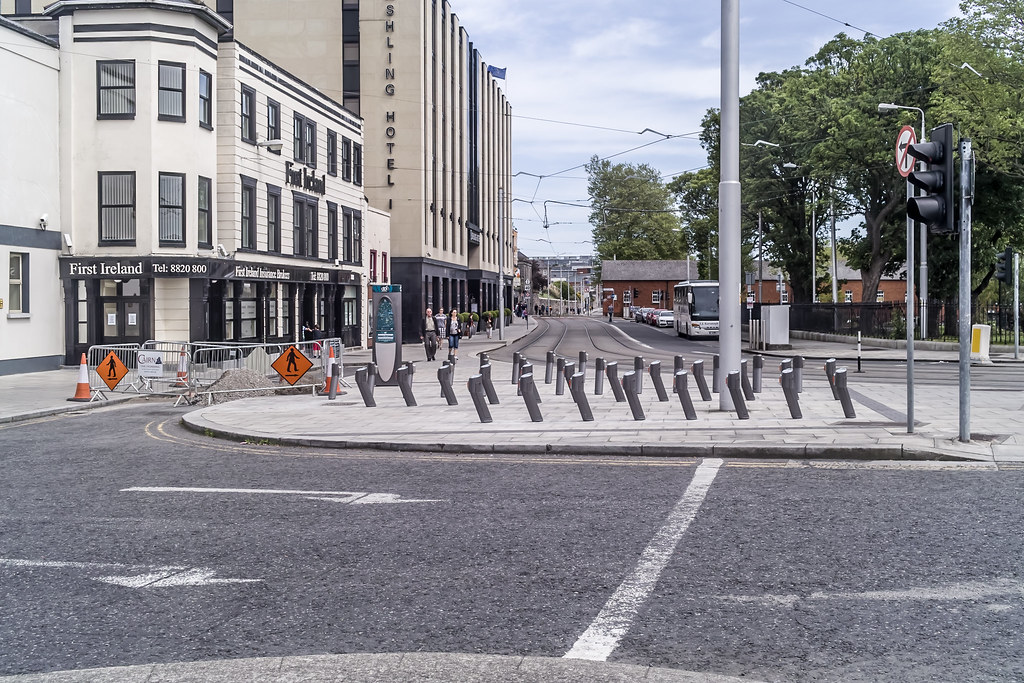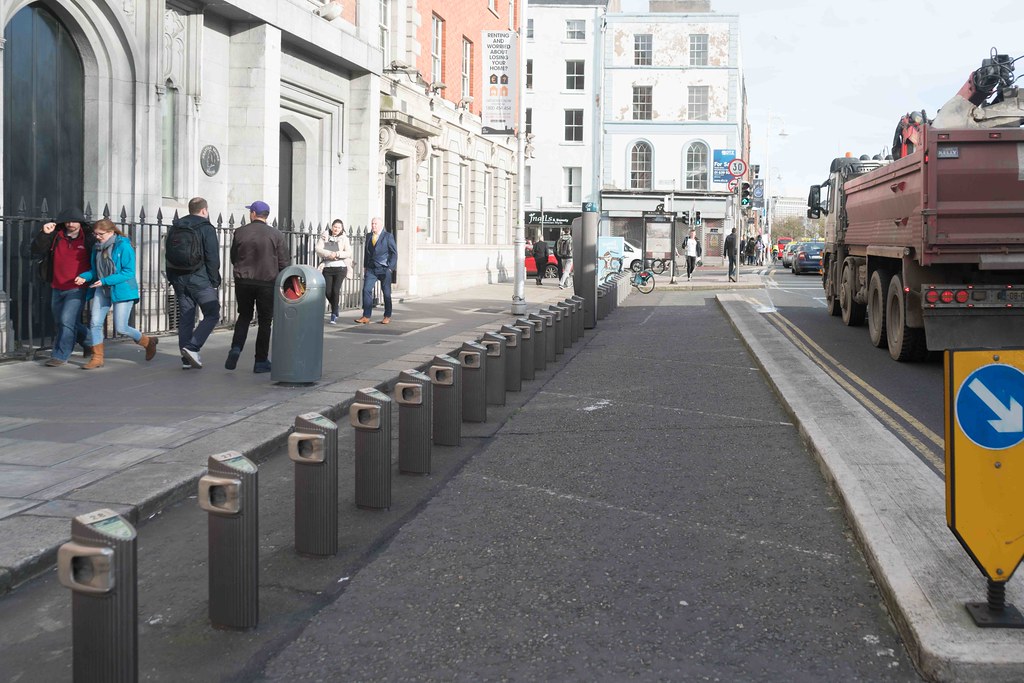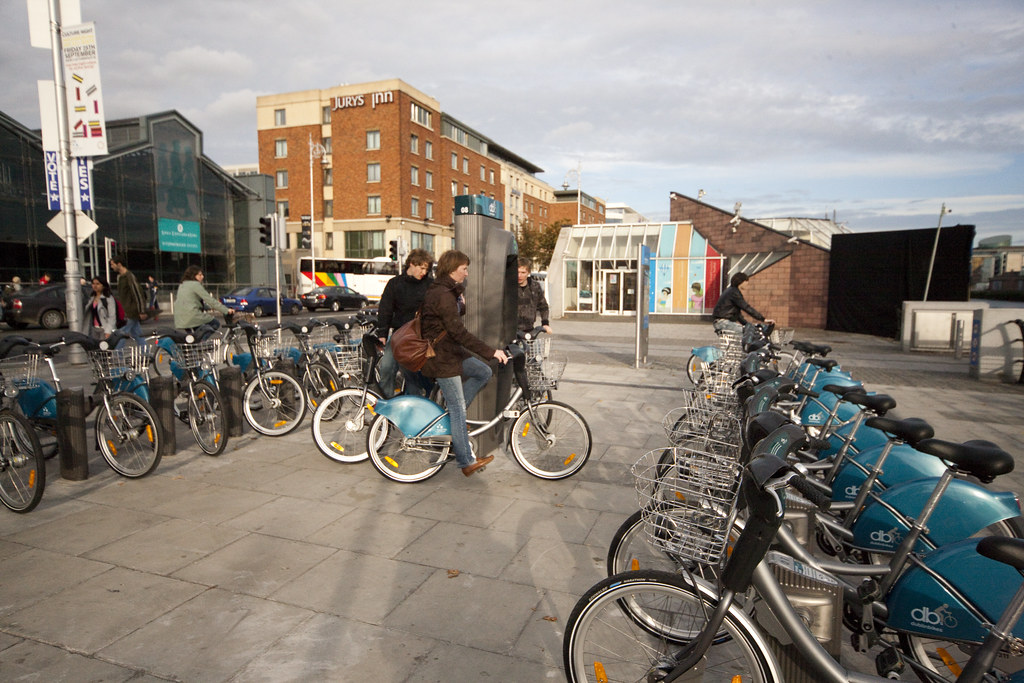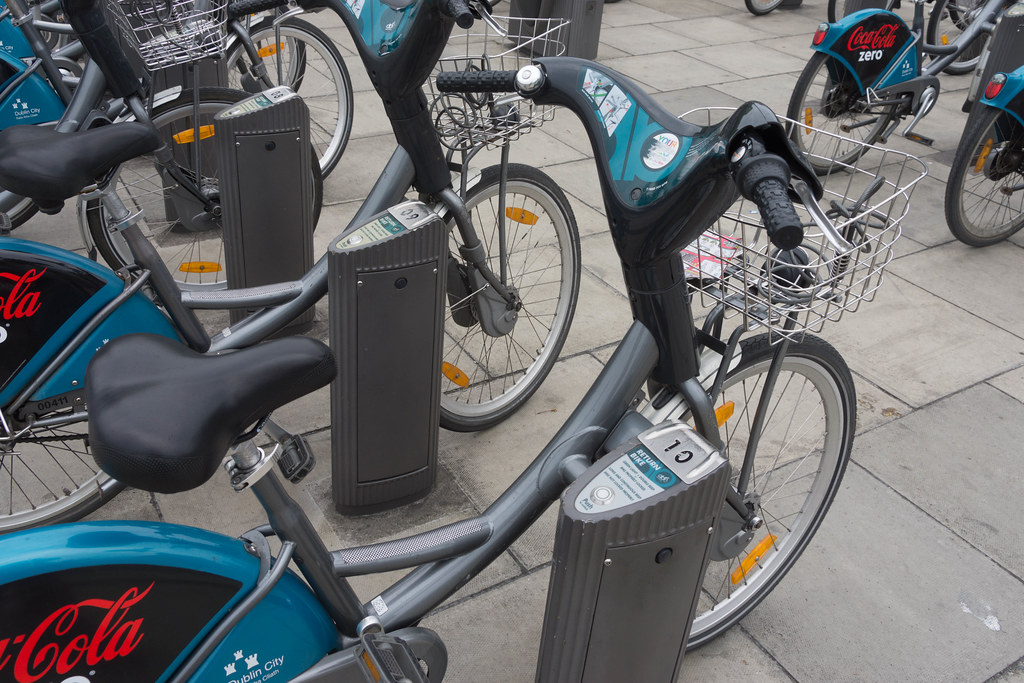DUBLINBIKES DOCKING STATION NETWORK
Dublinbikes is a public bicycle rental scheme which has operated in the city of Dublin since 2009. At its launch, the scheme, which is sponsored by JCDecaux, used 450 French-made unisex bicycles with 40 stations. By 2011 this had expanded to 550 bicycles and 44 stations, and in 2013 it was announced that a major expansion of the scheme would add a further 950 bikes and another 58 hire points. Dublin was the 17th city to implement such a scheme, and it is considered one of the most successful bike sharing schemes in the world.
The scheme proved to be a great success, much exceeding predictions. Approximately 1,000 people used the bicycles in the first six hours, with a further thousand people having subscribed to use them. Some 11,000 people applied in the first fortnight and Dublin City Council's supply of subscriber cards was reduced to zero, with the Council having initially targeted a 5,000-person uptake in the first year. More than 25,000 people had applied to take part in the scheme by March 2010. Minister for the Environment, Heritage and Local Government John Gormley said after the launch this level of uptake indicated the new "mainstream" approach to cycling in Ireland.
In the first ten months of the scheme, it was reported that there were over 37,000 users, over 828,000 journeys, no accidents, no vandalism, and only one bike missing (which was recovered).
On 10 May 2010 (post-launch), city councillors in Dublin voted for more advertising hoardings to be used to help with payments, with more than 30,000 people having subscribed (1,500 was the predicted number of subscribers for this stage of the project). On 14 August 2010, it was announced that the scheme had reached its one millionth trip. By May 2011, two million journeys had been made and the scheme had expanded to 550 bicycles and 44 stations. In 2013 it was announced that a major expansion of the scheme would add a further 950 bikes and another 58 hire points.
The robust bicycles are produced by the French bicycle company Mercier in Hungary and are repaired by JCDecaux. They are three-speed bicycles, fitted with Shimano Nexus gears which can be changed up and down using a twist/grip shifter on the right handlebar. A Shimano hub dynamo in the front wheel generates power for front and rear always-on LED lighting. The bikes are fitted with Schwalbe Marathon tyres. Other components include a locking system, an adjustable cushioned saddle, a front bicycle basket, a kick stand and a bell.
Each station is equipped with an automatic rental terminal and stands for approximately 20 bicycles. Initially, fourteen terminals have credit card facilities enabling the user to purchase a 3-Day Ticket.
If a user arrives with a rented bicycle at a station without open spots, the terminal grants another fifteen minutes of free rental time. The rental terminals also display information about neighbouring dublinbike stations, including location, number of available bicycles and open stands. A fleet of bicycle-transporting vehicles are used to redistribute bicycles between empty and full stations.
In November 2010, a major five-year expansion plan was adopted due to the huge success of the scheme thus far. The plan will see the number of bikes increase from 450 to 5,000 and the number of bike stations increase from 40 to 300. The scheme will be extended as far north as DCU, as far south as UCD, as far east as Sandymount and as far west as Inchicore. The expansion will be funded differently than the original scheme, most likely through a mix of public and private funding.
In July 2012 it was announced that the first part of the scheme would begin before the end of the year.
The scheme proved to be a great success, much exceeding predictions. Approximately 1,000 people used the bicycles in the first six hours, with a further thousand people having subscribed to use them. Some 11,000 people applied in the first fortnight and Dublin City Council's supply of subscriber cards was reduced to zero, with the Council having initially targeted a 5,000-person uptake in the first year. More than 25,000 people had applied to take part in the scheme by March 2010. Minister for the Environment, Heritage and Local Government John Gormley said after the launch this level of uptake indicated the new "mainstream" approach to cycling in Ireland.
In the first ten months of the scheme, it was reported that there were over 37,000 users, over 828,000 journeys, no accidents, no vandalism, and only one bike missing (which was recovered).
On 10 May 2010 (post-launch), city councillors in Dublin voted for more advertising hoardings to be used to help with payments, with more than 30,000 people having subscribed (1,500 was the predicted number of subscribers for this stage of the project). On 14 August 2010, it was announced that the scheme had reached its one millionth trip. By May 2011, two million journeys had been made and the scheme had expanded to 550 bicycles and 44 stations. In 2013 it was announced that a major expansion of the scheme would add a further 950 bikes and another 58 hire points.
The robust bicycles are produced by the French bicycle company Mercier in Hungary and are repaired by JCDecaux. They are three-speed bicycles, fitted with Shimano Nexus gears which can be changed up and down using a twist/grip shifter on the right handlebar. A Shimano hub dynamo in the front wheel generates power for front and rear always-on LED lighting. The bikes are fitted with Schwalbe Marathon tyres. Other components include a locking system, an adjustable cushioned saddle, a front bicycle basket, a kick stand and a bell.
Each station is equipped with an automatic rental terminal and stands for approximately 20 bicycles. Initially, fourteen terminals have credit card facilities enabling the user to purchase a 3-Day Ticket.
If a user arrives with a rented bicycle at a station without open spots, the terminal grants another fifteen minutes of free rental time. The rental terminals also display information about neighbouring dublinbike stations, including location, number of available bicycles and open stands. A fleet of bicycle-transporting vehicles are used to redistribute bicycles between empty and full stations.
In November 2010, a major five-year expansion plan was adopted due to the huge success of the scheme thus far. The plan will see the number of bikes increase from 450 to 5,000 and the number of bike stations increase from 40 to 300. The scheme will be extended as far north as DCU, as far south as UCD, as far east as Sandymount and as far west as Inchicore. The expansion will be funded differently than the original scheme, most likely through a mix of public and private funding.
In July 2012 it was announced that the first part of the scheme would begin before the end of the year.
THE IMAGES BELOW ARE SELECTABLE MENU OPTIONS
-

STATION 87 COLLINS BARRACKS
-

GRAND CANAL SQUARE
-

PORTOBELLO
-

DOCKING STATION 86
-

NORTH KING STREET STATION 101
-

DOCKING STATION 17 GOLDEN LANE
-

STATION 88 BLACKHALL STREET
-

DOCKING STATION 49 GUILD STREET
-

STATION 65
-

TOWNSEND STREET
-

STATION 99
-

PHIBSBOROUGH ROAD
-

STATION 46 STRAND STREET
-

STATION 67
-

03 BOLTON STREET
-

STATION 22
-

WESTERN WAY 116
-

CUSTOM HOUSE
LOADING
- Barrow Street
- Benson Street
- Blackhall Place
- Blessington Street
- Bolton Street
- Brookfield Road
- Cathal Brugha Street
- Charlemont Place
- Chatham Street
- Christchurch Place
- City Quay
- Clonmel Street
- Collins Barracks Museum
- Convention Centre
- Custom House
- Custom House Quay
- Dame Street
- Denmark Street Great
- Deverell Place
- Earlsfort Terrace
- Eccles Street
- Eccles Street East
- Emmet Road
- Exchequer Street
- Excise Walk
- Fenian Street
- Fitzwilliam Square East
- Fitzwilliam Square West
- Francis Street
- Frederick Street South
- Fownes Street Upper
- Georges Quay
- Golden Lane
- Grand Canal Dock
- Grantham Street
- Grattan Street
- Greek Street
- Guild Street
- Hanover Quay
- Harcourt Terrace
- Hardwicke Place
- Hardwicke Street
- Hatch Street
- Herbert Place
- Herbert Street
- Heuston Bridge (North)
- Heuston Station (Car Park)
- Heuston Station (Central)
- Heuston Bridge (South)
- High Street
- James Street
- James Street East
- Jervis Street
- John Street West
- Kevin Street
- Kilmainham Gaol
- Kilmainham Lane
- King Street North
- Leinster Street South
- Lime Street
- Market Street South
- Mater Hospital
- Merrion Square East
- Merrion Square West
- Molesworth Street
- Mount Brown
- Mount Street Lower
- Mountjoy Square West
- New Central Bank
- Newman House
- North Circular Road
- Oliver Bond Street
- Ormond Quay Upper
- Parkgate Street
- Parnell Street
- Parnell Square North
- Pearse Street
- Princes Street / O'Connell Street
- Portobello Road
- Portobello Harbour
- Rothe Abbey
- Royal Hospital
- Sandwith Street
- Sir Patrick Dun's
- South Dock Road
- St. James Hospital (Central)
- St. James Hospital (Luas)
- St. Stephen's Green East
- St. Stephen's Green South
- Smithfield
- Smithfiled North
- Strand Street Great
- Talbot Street
- The Point
- Townsend Street
- Upper Sherrard Street
- Western Way
- Western Way Broadstone Station 116
- Wilton Terrace
- Wolfe Tone Street
- York Street (East)
- York Street (West)
You will find links to buy products from Amazon, Google and other partners. If you click on these links, you’ll find that the URL includes a small extra piece of text which identifies that the click came from my websites. This text is an affiliate code, and it means that I get a small percentage of the money you spend if you choose to buy that product, or, in some cases, other products from the site soon after. These affiliate links help pay the costs of producing my websites and ensure that the content is free to you.
COPYRIGHT INFORMATION BELOW APPLIES ONLY TO PHOTOGRAPHS

This work by William Murphy aka Infomatique is licensed under a Creative Commons Attribution-NonCommercial-ShareAlike 4.0 International License.
Permissions beyond the scope of this license may be available at https://excellentstreetimages.com/in-the-year-twentytwenty/copyright/.
